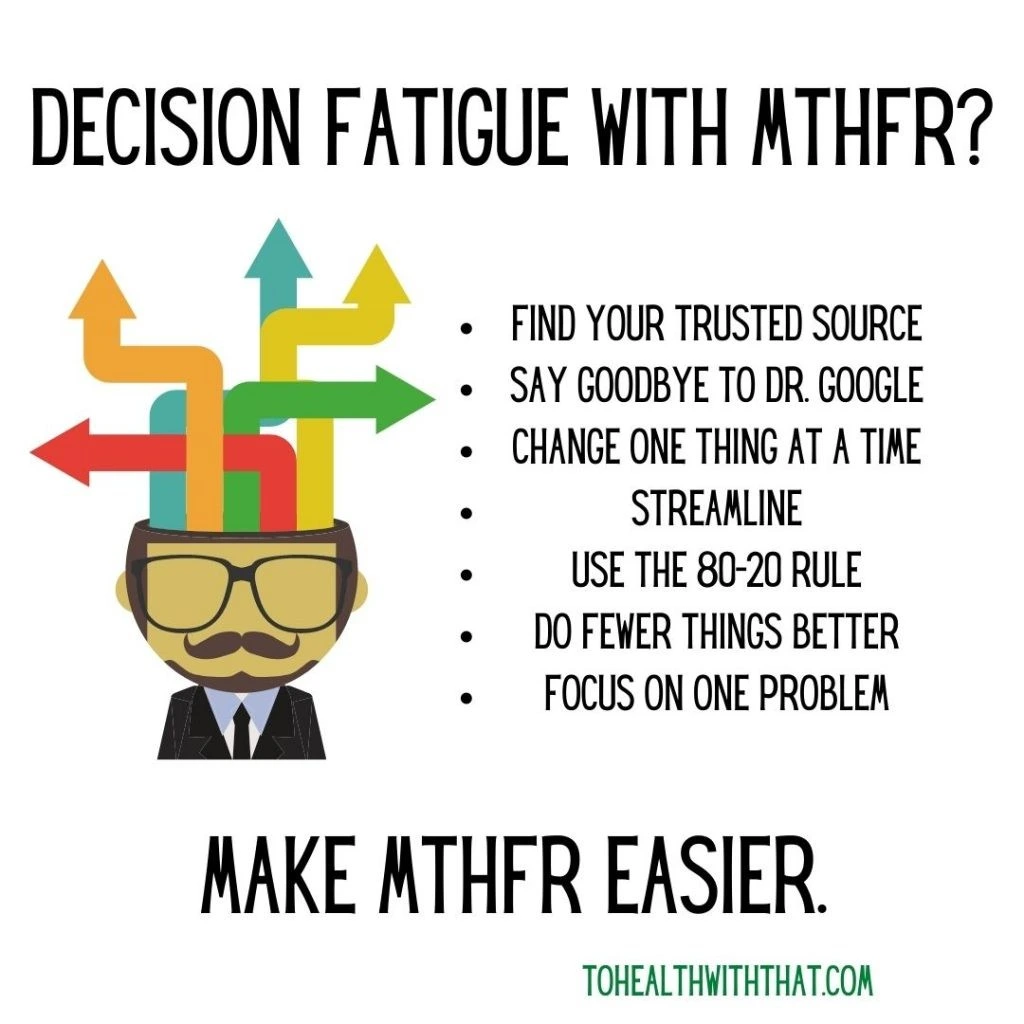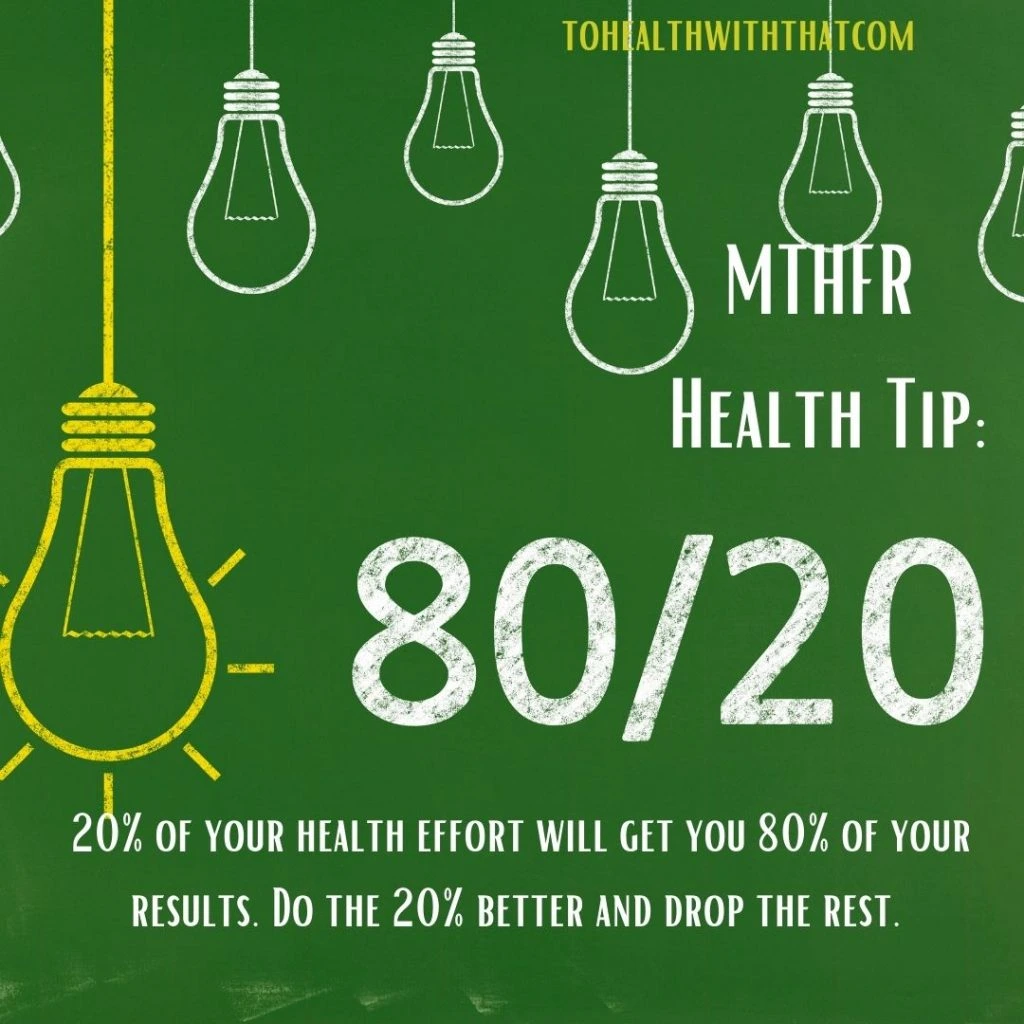We’ve had a number of heavy topics lately and I wanted to lighten it all up a bit this week by talking about something that is sorely needed for many MTHFR folks. That is ease. Ease, ironically, is something we don’t tend to do easily, especially when it comes to self-care.
The joy and devastation of the internet is that it offers every human looking around an infinite variety of opinions, an infinite number of ways to take care of themselves, and every conflicting idea in its full glory. This leaves us with an unmanageable amount of information to sift through and the burden of a ridiculous number of decisions about the best way to care for ourselves. In short, self-care requires not only the time and energy that is needed to actually exercise, eat good food and do your things, but also the mountain of time and energy needed to figure out what those things should be.
Unfortunately, “because your mother told you to” is not the rationale most people use in their decision tree on this topic unless their mother happens to be a brain surgeon, PhD, actor, or social influencer. Those are the voices we listen to these days and in some ways that is beneficial, but it becomes a clamor of 1000 voices rather than one.

Decision Fatigue
Decision fatigue is the mental and emotional strain resulting from the burden of choices. It often feels like a deep sense of weariness and can be a red flag that you’re headed for burnout. Burnout happens in self-care as easily as it happens at the office and it shows up in some potentially familiar ways.
- Procrastination – “Nevermind, it isn’t due until Friday…”
- Avoidance – “I just can’t deal with this today.”
- Impulsivity – “Cooking is hard, but chips are easy.”
- Indecision – “Oh, I don’t know. You choose.”
It’s not just the giant life-choice decisions that weigh heavily. It turns out the little ones do too. Are you wearing brown or red shoes? Will it be oatmeal, eggs, or cereal? Will you start the laundry or leave it? None of these decisions have any consequence at all, but all of them produce anxiety and require resources. The same resources have to be used for the big stuff like Should I have that procedure? Do I need to call a specialist? Or can I fit physiotherapy into my budget? Actually, just reading the list of questions is exhausting, let alone making the decisions.
In a situation like MTHFR, there isn’t truly a one-size-fits-all path forward. It’s a very individual journey and that can increase the likelihood of decision fatigue.
In good news, there are some things you can do to minimize the decision fatigue around MTHFR, make it all a little easier and free up some resources to use in other areas of your life.

Tips To Avoid the MTHFR and Decision Fatigue Problem
- Find your trusted source – the internet is awash with opinions, right ways forward, testimonials, and products that are miracle cures. Find one voice you trust and actually try their program, protocol or suggestions. Mixing and matching is a great idea in your wardrobe but doesn’t work so well with health management strategies. Also, this cuts down on the random “Dr. Google” ideas.
- Stop talking to “Dr. Google” – once you find the voice you trust, stop searching for more unless you decide to choose a different voice and follow a different path. Let one system be enough and don’t continue to search and search. Too often people don’t get the benefits of one plan because they are constantly adding in other things. It’s like mixing diets in the style of Bridget Jones.
- Change one thing at a time – with MTHFR, there is a tendency to have challenging or unexpected reactions to supplements or diet changes. By only changing one thing at a time and giving your body at least a week to two weeks between each change to your self-care routine, you can actually sort out which changes are useful and helpful and which ones aren’t.
- Streamline what you’re currently doing – this is a step that is so often overlooked and it really matters for everyone, not just for people with MTHFR issues. At least quarterly, sit down and take stock of your health habits. This includes prescriptions and supplements that you are taking, exercise, diet strategies, self-care, and practitioners. Do this on a day when you have some time and energy to spare. Be willing to let go of things that aren’t working so that you aren’t just adding more ineffective strategies to a heap of ineffective strategies you already have. Make the things you do for your health, count because they all take time, energy, and money. Talk with your doctor if there are prescriptions that might no longer be needed or that aren’t actually solving the problem they were intended to solve.
- Use the 80-20 rule – this aphorism tells us that 80% of your results come from 20% of your actions. I believe this applies to your health as well. Can you find the few health actions you’ve taken that are giving you your 80% and double down on those? Even better, can you let go of some or even all of the rest? I can easily tell you my 20%:
- Eating wheat and folic acid-enriched product-free.
- Prioritizing sleep and sleep hygiene.
- Magnesium every night

- Do fewer things better – doing fewer things for your health but doing them really well is far better than doing more poorly. Sticking to a diet, prioritizing sleep, and taking a multivitamin is going to be far more effective than doing a diet, detox, new exercise program, mindfulness routine, and 18- pill per day supplement program that you get right one day out of five. Pick your battles.
- Focus on one problem – every little symptom probably doesn’t need its own plan. Focus on one big problem like energy or sleep and let smaller stuff go.
Not only will this make each day a little bit easier, but it will also add up to better results with your health. Never underestimate a clear path forward and the power of doing only a few things, well.
MTHFR is a common genetic mutation that can contribute to anxiety, depression, fatigue, chronic pain, infertility, and more serious conditions like breast implant illness, heart attack, stroke, chronic fatigue syndrome, and some types of cancer. If you know or suspect you have an MTHFR variant, schedule a free 15-minute meet-and-greet appointment with MTHFR expert Dr. Amy today.
Book Your Appointment
